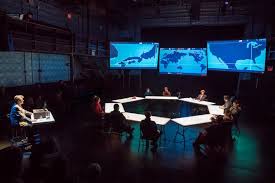“Get out your phones!” commands ‘Madam President’, “and set an alarm for 60 minutes”. Thus are the limits set for Unexploded Ordinances, the award-winning show from Peggy Shaw and Lois Weaver of Split Britches, co-written with Hannah Maxwell. The action takes place against the ticking clock of a threatened nuclear detonation, where Shaw’s bumbling General and Weaver’s President preside over a ‘situation room’, using a literal council of elder, picked from among the oldest audience members (“Who was alive in the Second World War? Who was alive in the Korean conflict?”).
The titular unexploded ordinances (or UXO) represent the unexplored or unfulfilled desires, especially those of the older generations, and also the anxieties, the “things that keep us awake at night” which threaten our modern world, as well as referencing the literal unexploded civil war munitions under the soil of Governor’s Island in New York where the show was partly developed. Under three threatening screens showing Dr Strangelove-inspired imagery, black and white footage and war-time radar maps, the council is invited to talk about their worries and their desires, producing an unsettling effect of both alienation and intimacy.
The contrast is heightened by the interplay between Shaw and Weaver, who have been working together in Split Britches since 1980 and whose sense of comfortable rapport was like an old married couple – fitting for a duo whose performance has explored feminism, queer culture and politics for 37 years. The show marks the return to the UK for Split Britches after Peggy Shaw’s Ruff, which toured in 2016. Shaw suffered a stroke in 2011 which affected her short term memory and it was interesting to see how the duo worked with and incorporated this into the role of the General, who read his part from a script, occasionally breaking off to sing and dance like someone’s geriatric uncle at a birthday party, while Weaver, in skirt suit and garters, held and directed the conversation of the elders skilfully – sometimes as the President, sometimes as Lois herself, as they tried to find a solution, or an ending. This is achieved finally not by the poignant urgency of numerous digital alarms, but by the elder picking at random and reading out ‘unexplored desires’ from bits of screwed up paper, written by audience members before each show; to find a solution ‘we could’: “learn an instrument”, “move to Venice” – or “try S and M”.








